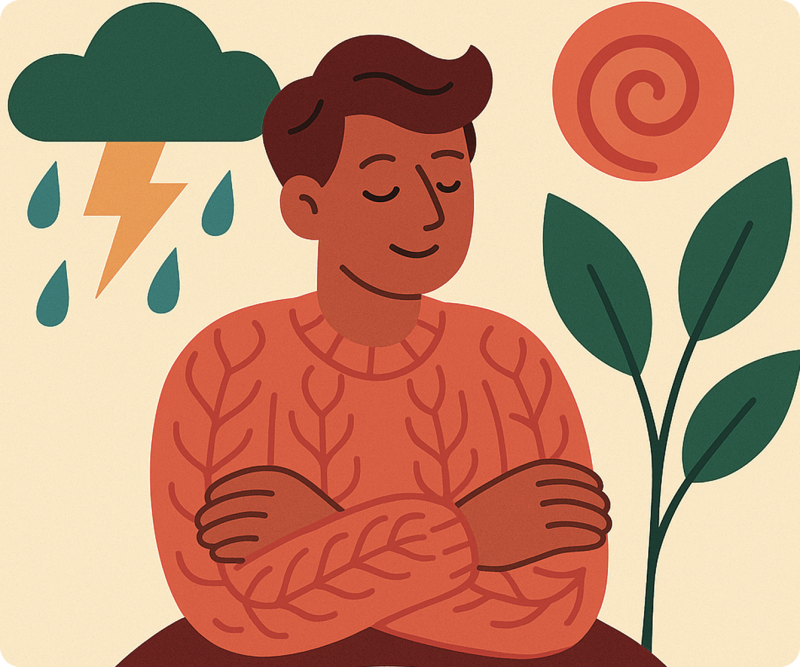
Stress
Stress is a normal physical response to situations in which you feel upset or fear being harmed. Some mild stress can be helpful – it can help you feel active and alert when you are in a threatening situation. Stress can help you to perform at your best during pressured situations such as sport, exams, and job interviews. However, ongoing feelings of stress can become a serious long-term health issue that can intensify rapidly, and cause you great unhappiness and restlessness. Long-term stress can be caused by ongoing difficulties you face, which you feel you are incapable of resolving.
Common signs & symptoms
- Inability to concentrate
- Constant worrying or racing thoughts
- Irritability and quick to anger
- Feeling lonely, unhappy or isolated
- Rapid heartbeat, nausea
- Inability to relax or wind down
- Changes to appetite or sleep
- Changes to sex drive
- Substance use or abuse
- Nervous tics and behaviours
- Feeling overwhelmed.
Causes or contributing factors
Stress can be triggered by a wide range of life experiences or internal pressures, including:
- Work demands, job insecurity or burnout
- Financial pressures
- Relationship difficulties or family conflict
- Major life changes
- Ongoing health issues or caregiving responsibilities
- Study or academic pressure
- Perfectionism or high self-expectations
- Lack of support or feelings of isolation
Stress often builds over time when multiple pressures accumulate, especially if you don’t have the space or support to decompress.
What you can do
While therapy is often key in addressing the root causes of stress, there are several self-care strategies that can support your wellbeing:
- Practise mindfulness or deep breathing exercises to ground yourself
- Build regular physical activity into your week
- Set boundaries around work, technology, and personal time
- Stay connected with supportive people
- Prioritise rest and sleep where possible
- Reduce or avoid alcohol, caffeine, and other stimulants
- Engage in hobbies or activities that bring you calm or joy
- Break tasks into manageable steps to reduce overwhelm
- Seek professional help when stress begins to affect your daily life
How we can help
At Seed Psychology, we understand that stress can feel all-consuming—and that no two people experience it in the same way. Our compassionate psychologists will take the time to understand what’s contributing to your stress and how it’s impacting your life.
We draw on evidence-based approaches such as Cognitive Behavioural Therapy (CBT), Acceptance and Commitment Therapy (ACT), and Mindfulness-based therapies to help you:
- Identify unhelpful thought patterns and stress triggers
- Develop healthy coping strategies and emotional regulation skills
- Improve your ability to manage pressure and make empowered choices
- Reconnect with your values, goals, and sense of self
- Create sustainable change that supports long-term wellbeing
Whether you’re feeling burnt out, stuck in a cycle of overwhelm, or just not quite yourself, you don’t have to go through it alone.
Connect with us to book an appointment with a psychologist in our Brunswick clinic or via telehealth Australia-wide.
Through connection,
change is possible
Our compassionate team at Seed Psychology is here to help you regain your wellbeing and navigate life’s challenges with greater confidence and clarity. Connect with us to book an appointment with a psychologist in our Brunswick clinic or via telehealth Australia-wide.
Available resources
Meet our amazing team of therapists
Our diverse team of psychologists offer individual, couples, and online therapy, as well as assessments. Beyond their expertise, they bring humanity and care, providing respectful, affirming support tailored to each person’s unique experience.
Freqeuently asked questions
-
You do not need a referral to see a Psychologist at Seed Psychology. However, if you’d like to claim a Medicare rebate, you will need a Mental Health Care Plan (MHCP) from your GP. With a MHCP, you may be eligible for rebates on up to 10 sessions per calendar year. These sessions can be used at any psychology clinic of your choice. To access Medicare psychology rebates, book an appointment with your GP and ask for a Mental Health Care Plan. Most referrals begin with 6 sessions, with the option to access 4 more after a review. Referrals can also be provided by a psychiatrist or paediatrician.
-
Yes, we offer in person sessions at our Brunswick East practice and secure online appointments. Our online services make it easy to connect with your Psychologist from anywhere, offering flexibility without compromising on care. Whether you attend in person or online, you’ll receive consistent, high-quality support.
-
To book an appointment, simply use our booking form, or call our client care team on 9388 8113.
-
Our goal is to make mental health care approachable, inclusive, and clear—so you always know what to expect.
Individual Therapy Sessions
- Private clients (no referral): $255 – $285
- Clients with a MHCP: $230 – $285
- Medicare rebates: $96.65 – $141.85 per session (depending on the clinician)
- Private clients (no referral): $255 – $285
-
At Seed Psychology, your safety and wellbeing are our highest priorities. While we are here to support you through regular therapy sessions, we are not a crisis service and may not be available outside of scheduled appointments. If you or someone you care about is in immediate danger, experiencing a mental health crisis, or needs urgent support, it’s important to seek help straight away through the appropriate emergency or crisis services. You can find a list of trusted organisations and services here that can provide immediate support when you need it most.











